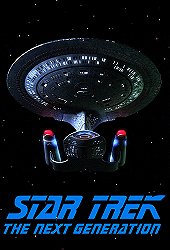After a rocky first two seasons, Star Trek: The Next Generation eventually emerges as a smartly acted ensemble piece. It’s a giant science-fiction space opera which is happier to let characters talk and explore their moral quagmires than it is to have them shooting lasers at each other. I welcome this change of pace, and by the end had grown very attached to this motley crew.
The first season is an unsettled affair with many of the actors unclear on their characters and trying to find them. The various plot strands feel messier than they would in later seasons, but this does mark the first appearance of Q’s many guest roles as an antagonist and helper of the Enterprise crew. The death of Tasha Yar, a character I never warmed up to or cared much about (mostly thank to Denise Crosby’s poor performance), sets up what would become a major conflict later on in the series.
And the second season doesn’t offer much better. Gates McFadden left for the second season only to return in the third. During this interim she was replaced by Diana Muldaur, a perfectly fine actress who never seemed to find her groove with the rest of the cast. Both seasons had a bad habit of wrapping up an episode with boy genius Wesley Crusher (Wil Wheaton) coming up with some crazy scientific solution to the conflict. Mercifully this became less prominent as the series went before jettisoning the character off to the academy towards the end of the run.
But by the time the series had entered its third season everything was beginning to come together properly. The ratio of good, some even great, episodes to mediocre or bad ones tips largely on the positive side by this time, and the cast finally found their specific voices. Patrick Stewart’s academic and pacifistic Picard is a complicated man, and a two-part episode where he is kidnapped and tortured for information is a highlight. It’s the kind of work and material that would win an actor an Emmy in a straight drama, but this being a space opera, he went woefully ignored. Jonathan Frakes as the randy, roguish Riker plays like an infinitely more mature and complex variation on Captain Kirk. But no two actors shined brighter throughout the series than Michael Dorn as Worf and Brent Spiner as Data.
Data’s a fascinating character, occupying the Spock-like role as a more human-than-human other in the series. And his season two episode “Measure of a Man” is a highlight. It presents every issue and reaction to the android that the series had brought up to that point, and a few interesting debates and moments which the series would then go on to explore in greater detail. And Dorn’s Worf transitions from more ferocious warrior to softer father figure and lover by the end, forming a strange familial unit with his son and Deanna Troi.
Deanna Troi, however, was always a problematic aspect of the show for me. She’s an interesting enough character, but the show constantly made her the object of sexual harassment, mind-control, and the repeated victim of kidnapping. This problematic aspect stood out very brightly whenever an episode would feature her in a leading role. Not all of her episode dripped with such casual misogyny, but more than enough of them did to wonder why the writer kept forcing Marina Sirtis to act this stuff out.
But by the seventh, and final, season everything on the Enterprise was running smoothly. The chemistry between the characters was what kept the series engaging and fresh. Various guest stars kept things interesting, and some like Whoopi Goldberg and Jennifer Jones were incredibly successful characters adding interesting dynamics in their episodes. But The Next Generation is beloved for that core group, and the creators knew this. They managed to craft the perfect finale which looked to the past, a possible future, and the present at the same time.
It’s another dynamite showcase for Stewart’s great talents as an actor. I swear, he can take any material thrown at him and give it a gravitas and meaning well beyond the worth of the words. But The Next Generation frequently gave him chances to give intelligent, hopeful monologues about numerous topics disguised as a fun action/adventure science-fiction series. And everything that was great about the series is located in the two hour finale. It’s a large time investment, at 45 minutes each and 176 episodes to get through I think that may qualify as an understatement, but if you can manage to ride out the flabby first two seasons then you’ll be in the perfect spot to enjoy what may just be one of the finest shows of its kind, ever.
 Login
Login